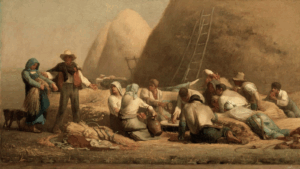Of Injustices, Divine Death Penalties, and Social Safety Nets
Read Genesis 38 with me. I relish teaching this story twice a year to my “Bible and Culture” General Education classes because all the students—including those who enroll in the required class overconfident in their Bible knowledge—listen wide-eyed and wide-mouthed. They are shocked by its content.
This story is not as horrific as the “other Tamar” story (2 Samuel 13); this Tamar has a bit more agency than the other. Also, this Tamar sees some justice in the end. In the middle of her story, we find scandal, sex, and unfamiliar cultural practices. This gives me plenty of material to compel even the sleepiest undergraduate to sit up and pay attention.
The passage begins with JudahJudah was the name of Jacob's fourth son and one of the 12 tribes. More. In the previous chapter, Judah had tricked Joseph (Genesis 37:26-27). Here, the trickster gets tricked.
Wicked
Judah and his Canaanite wife, the daughter of Shua, have three sons. For their eldest son Er, they take a wife named Tamar (verse 6). The text does not specify Tamar as Canaanite, but it is reasonable to assume that based on the context. In short order, the Lord kills Er because he was “wicked.” This is a good opportunity for theological reflection—what of a God who outright kills someone for their wickedness? Is that what we believe about God, or is that something we should just attribute to our ancestors in faith? I reframe those questions by asking: “Is there anyone so wicked that you wish God might just eliminate them? Are there times when that would seem like fitting justice?”
An important textual feature hidden to those of us reading in English is that Er’s name is the Hebrew word for “wicked,” spelled backwards. One commentator likens it to an English play on words: “Er erred” (Gordon Wenham Word Biblical Commentary Genesis 16-50, 1994, 366). Compare it to a fairy tale name that divulges a central character trait—like “Prince Charming,” but from the opposite end of the moral spectrum.
A social safety net
The next thing that happens requires some sociocultural background information. Judah instructs his second-born son Onan to “Go in to your brother’s wife and perform the duty of a brother-in-law to her; raise up offspring for your brother” (verse 8). This instruction refers to the practice of brother-in-law marriage, or levirate marriageLevirate marriage is a marriage in which a childless widow marries her husband's brother in order to continue the line of her dead husband. Ruth is married to Boaz in a Levirate-like marriage (actually a kinsman marriage). This Mosaic law is at the heart of... More, using the Latin term for brother-in-law. Deuteronomy 25:5-10 explains this rule, and it is known in various tribal cultures throughout history. The association of the term “marriage” with this practice is misleading, as the point was for the next eldest brother of a widow’s deceased husband to have sex with her (“go in to” is not even a thinly-veiled euphemism!) until she bears a son who will carry on the line of the woman’s deceased husband.
This male child secures the widow’s place in the family socially and economically, providing her with a social safety net. Widows were not supposed to return to their own homes of origin, and they could not just go out and remarry whomever they wanted. But the practice was disadvantageous to the brother-in-law, which is why Deuteronomy 25:7-10 specifies a way for him to shamefully renege on this responsibility. By impregnating the wife of his deceased brother, his share of the inheritance—which would have increased when there was one fewer brother—would decrease again when he fathered a placeholder recipient for that portion.
Onan abuses his brother-in-law responsibility. He takes advantage of Tamar sexually: “But since Onan knew that the offspring would not be his, he spilled his semen on the ground whenever he went into his brother’s wife, so that he would not give offspring to his brother” (verse 9). That line always gets my students’ attention! A more literal translation than “spilled his semen” would be “he spoiled groundward.” Furthermore, the word “whenever” indicates that it was a repeated action on Onan’s part. In Sex Ed they call this “premature withdrawal.” I always take a moment to instruct my students this is not a reliable form of birth control or prevention of STDs! The situation angered the Lord, who now kills this second son of Judah and his wife.
Here again we have an opportunity for theological reflection. Perhaps this passage gives us some insight about who our ancestors in faith thought deserved the divine death penalty (Er and Onan), and who did not deserve the community’s capital punishment—we find that out at the end of the story. Surely, it prompts us to engage in similar reflection.
Collateral
Before long, Judah dishonors Tamar by sending her back to her own father’s house, where she remains even after Judah’s third son Shelah is old enough to take on the brother-in-law responsibility (verses 11, 14). Thus, Judah denies her this social safety net. Meanwhile, Judah’s own wife dies, and he ironically takes on an analogous role as Tamar: she’s a widowA widow is a woman whose spouse has died, often plunging her into poverty and putting her in a vulnerable position in society. Jesus, in his concern for the poor, regards widows with compassion and concern. More; he’s a widower. This will highlight the huge double standard they faced in society. While Tamar remains in limbo, Judah goes out with his buddy Hirah to “sow his wild oats” (or as the text states, “shear his sheep,” verse 13). Perhaps this was a euphemism for finding a prostitute.
Upon hearing this, Tamar changes out of her widow’s attire and into a veil. The veil had no particular significance other than the fact that no one could recognize her. It did not indicate that she was a prostitute, though the place where she stood, “the road to Enaim” may have done so. But Judah assumed she was a prostitute and she did not disabuse him of that, though her intentions for the situation are tantalizingly ambiguous. When he propositioned her, she took him up on it. She knew who he was and that his word was unreliable, so she was clever to ask for collateral when he said he’d have to pay her later: He gave her his “signet and cord” (verse 18), which I liken to his wallet and car keys.
Occasionally an insightful student will ask how Judah did not recognize Tamar even though he had sex with her. This is an intriguing gap in the text! Maybe she remained veiled; maybe it was dark. Maybe this highlights how long it had been since Judah had seen Tamar, or how greatly he disregarded her.
When Tamar starts to “show,” Judah calls for her to be “burned” (verse 24). After all, Judah “owned” Tamar’s womb, and its fruits should not have belonged to anyone but his family. Ironically, that was exactly the case. Tamar sends Judah’s signet and cord back to him when word came of her execution. She had her own ancient paternity test. Though the text does not record a face-to-face interaction between these two soon-to-be parents, I love to imagine Tamar all up in Judah’s face, calling out in a sing-songy voice, “Oh Judah, I have your signet and cord…”
Judah responds with one of my favorite lines in the whole Bible: “She is more in the right than I” (verse 26).
Taking responsibility
Judah does not deny what he did. While he should have outright apologized, his words at least emphasize Tamar’s higher moral standing, despite the fact that in this cultural context she would have been seen as more guilty of wrongdoing than him. He does not execute her, nor does he have sex with her again (verse 26).
How infrequent it is that someone who abuses their power takes responsibility, even in such a small way! I think of sexual abusers in politics, show business, the corporate world, the church, and families who never come this close to an admission of guilt—never mind an apology. I think of the many ways in which vulnerable women are denied a social safety net.
I have profoundly mixed feelings about the clever—or desperate—way Tamar brought about the remarkable outcome of this story. What I love about this story is how Judah’s words set the world aright—at least a little bit. Sometimes that is the best thing a story can do: give an honest voice and better outcomes to a world with so little honesty or resolution about its injustices.
This Canaanite woman bests the ancestor whose line we claim as our own. What kind of community tells and re-tells a tale like this about itself? Does it constitute humility or humor or both? This story prompts us to consider so much: social safety nets, the treatment of women and foreigners, desperate times and measures, and divine and human anger at injustices.
The canonA canon is a general law or principle by which something is judged. The body of literature in the Old and New Testaments is accepted by most Christians as being canonical (that is, authentic and authoritative) for them. More helps us to remember Tamar: She is named twice in RuthThe great-grandmother of David. More, another story about a foreign widow. First, she is included in a blessingBlessing is the asking for or the giving of God's favor. Isaac was tricked into blessing Jacob instead of his firstborn Esau. At the Last Supper Jesus offered a blessing over bread and wine. To be blessed is to be favored by God. More to NaomiThe mother-in-law of Ruth. More (Ruth 4:12); next Tamar’s son is listed in David’s genealogyGenealogy involves the study and tracing of families through the generations—in short, family history. One genealogy in Genesis traces the nations descended from Noah. In the New Testament Matthew traces the ancestry of Jesus back to Abraham, while Jesus' genealogy in the Gospel of Luke... More of at the end of Ruth (4:18). Tamar even appears in the genealogy of JesusJesus is the Messiah whose life, death, and resurrection are God's saving act for humanity. More in MatthewA tax collector who became one of Jesus' 12 disciples. More (1:3).







